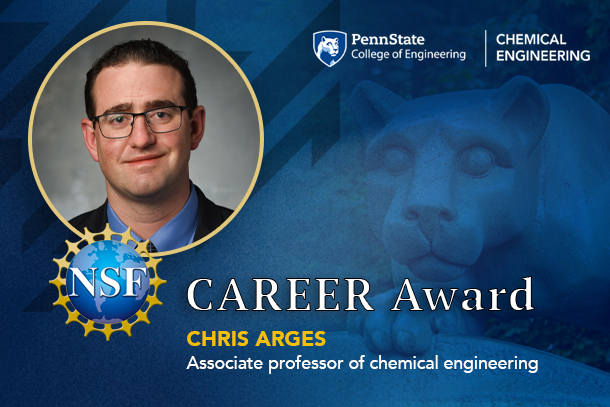
Chris Arges, associate professor of chemical engineering at Penn State, earned a five-year, $570,030 NSF CAREER Award. Credit: Penn State.
2022 NSF CAREER Award: Chris Arges
2/28/2022
UNIVERSITY PARK, Pa. — Chris Arges, associate professor of chemical engineering at Penn State, earned a five-year, $570,030 NSF CAREER Award for a project titled, “Electrochemical pumping with high-temperature ionomers for challenging gas separations.”
What do you want to understand or solve through this project?
In this project, we want to understand how the microstructure and composition of electrode ionomer binders in electrochemical hydrogen pumps affect the performance and energy efficiency for purifying hydrogen mixed with natural gas. Electrode ionomer binders are an adhesive material that hold the electrode particles together while also providing proton transport to and from the membrane.
There is significant interest in storing green hydrogen in the natural gas pipeline as it is an extensive and existing infrastructure in the United States. Green hydrogen is derived from water electrolysis that is powered on renewable energy sources like solar and wind. Because of embrittlement concerns of hydrogen with current pipeline materials, the hydrogen mixed with natural gas can only be stored at low concentrations — most likely 1% to 5% and in special cases, as high as 20%. End use applications of hydrogen require purified hydrogen near 100% and high pressures. Electrochemical hydrogen pumps can purify hydrogen to more than 99% from natural gas-hydrogen mixtures while also compressing the purified hydrogen — potentially up to a few hundred bar. The electrode ionomer binders we plan to investigate in this project are anticipated to have a profound impact on the performance and efficiency of electrochemical hydrogen pumps.
How will advances in this area impact society?
Advancing electrochemical hydrogen pump technology is important for wider adoption of hydrogen as an energy vector and chemical feedstock in the U.S. economy — especially in industrial sectors that are difficult to decarbonize such as fertilizer production, metal refining/steel production and powering heavy duty vehicle transportation. Hydrogen is also a cost-effective energy storage solution for intermittent renewable electricity generation and when long-term seasonal energy storage is required. To help meet ambitious goals of greenhouse gas and carbon emission reduction, it is imperative to advance electrochemical technologies, such as electrochemical hydrogen pumps, that generate, store and distribute hydrogen.
Will undergraduate or graduate students contribute to this research? How?
This project will involve two graduate student researchers and five undergraduate student researchers over five years. One graduate student, Karthik Arunagiri, is already at Penn State and will commence work on this project later this year. Karthik’s research will examine the electrochemical properties of thin film ionomers on interdigitated electrode arrays and will also study how the ionomer materials affect the performance and efficiency of electrochemical hydrogen pumps in membrane electrode assemblies. The second graduate student will focus on the synthesis of new ionomer copolymers featuring gas permeable repeat units. One undergraduate student researcher, Abishek Venkataraman, was hired this spring to support activities related to crosslinking high-temperature polymer electrolyte membranes. Other undergraduate researchers will come from the Department of Chemical Engineering’s National Science Foundation-funded Research Experience for Undergraduates program and the general undergraduate chemical engineering population. Additionally, this project will commission the first electrochemical unit operation, a hydrogen pump, in Penn State’s Unit Operations Laboratory to give students hands-on training with electrochemical systems. Electrochemical processes are poised to decarbonize chemical processes and it is paramount to train future engineers proficient in electrochemical engineering and electrochemical systems integration. Students interested in participating should email me at cga5126@psu.edu for more information.
The NSF CAREER Award not only funds a research project, but it also recognizes the potential of the recipient as a researcher, educator and leader in their field. How do you hope to fulfill that potential?
I am very humbled to receive the NSF CAREER research award. It is a recognition of the accomplishments by former and current postdoc, graduate and undergraduate researchers from my lab. I am also deeply indebted to numerous mentors and advisers over the years who have made an indelible impact on me as a researcher and educator. It takes a village to raise successful early career researchers.
At the end of the day, I am happy to be in ‘the fight’ to revolutionize our energy infrastructure and manufacturing processes for a sustainable planet. The challenges to decarbonize across the globe and upend our current industrial processes are significant and daunting. Support from NSF is vital to take on bold, risky new research directions, such as this project, to meet the challenge of our time. It also provides the support and opportunities to train a future work force, so they are competent in devising sustainable chemical processes — which was highlighted in a recent report from The National Academies of Sciences, Engineering, and Medicine titled “New Directions for Chemical Engineering.” At the end of the project, it is my hope that my research group will be a leader in high-temperature electrode ionomers for electrochemical systems.



